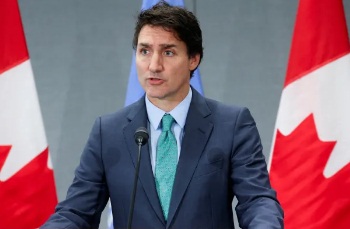Trudeau Ends 11-Year Leadership, Confronting India and Domestic Challenges…reports Asian Lite News
Canadian Prime Minister Justin Trudeau announced his resignation on Monday, ending an 11-year leadership role, including nine years as Prime Minister. His tenure has been marked by strained relations with India and domestic political challenges.
Trudeau, 53, confirmed he would step down as the leader of the Liberal Party and Prime Minister once a new leader is elected. Speaking outside his official residence, he stated, “I intend to resign as party leader, as Prime Minister, after the party selects its next leader through a robust, nationwide, competitive process.”
The House of Commons will be prorogued until March 24, preventing the opposition from forcing a no-confidence vote during this period. Trudeau’s decision follows mounting pressure from his party and declining public approval.
Trudeau’s leadership faced significant challenges, notably his confrontation with India over the alleged involvement in the killing of Khalistani leader Hardeep Singh Nijjar. Accusations against Indian leaders were made without concrete evidence, leading to tensions between the two nations.
Domestically, Trudeau struggled with growing unpopularity, partly due to his handling of issues related to Khalistanis and rising dissatisfaction with his government’s performance. His former ally, Jagmeet Singh, leader of the New Democratic Party, called for his resignation as support for the Liberal Party dwindled.
Trudeau’s government faced criticism for its perceived mishandling of national security. A report by the Canadian Customs and Border Protection Service indicated 358 individuals on terror watch lists were apprehended attempting to cross into the U.S. from Canada in 2024, fueling concerns over lax policies.
The resignation follows the ousting of Deputy Prime Minister Chrystia Freeland, whose departure intensified calls for Trudeau to step down. Freeland, a popular figure, resigned citing differences in the direction for Canada’s future.
Conservative Party leader Pierre Poilievre, who has criticized Trudeau for damaging Canada-India relations, is poised to capitalize on the Liberal Party’s instability. Poilievre labeled Trudeau’s leadership as “incompetent and unprofessional,” arguing it has strained Canada’s global relationships.
As Trudeau exits, the Liberal Party faces the challenge of electing a new leader to stabilize the government. If no consensus is reached, early elections may be inevitable, potentially giving the Conservative Party an edge.
Trudeau’s political legacy includes a mixture of early acclaim and later discontent, as rising living costs and concerns over crime affected his popularity. His approval rating plummeted to 22 percent, reflecting the nation’s disillusionment with his leadership.
Despite his resignation, Trudeau expressed his ongoing commitment to Canada, stating, “I’m a fighter. Every bone in my body has always told me to fight because I care deeply about Canadians.”
Trudeau’s resignation marks the end of a significant era in Canadian politics, as the country prepares for a potential shift in leadership and policy direction.
ALSO READ-Trump Rekindles Proposal to Annex Canada Following Trudeau’s Resignation

Leave a Reply